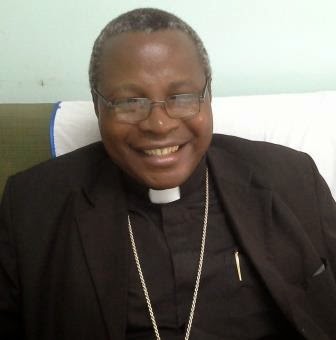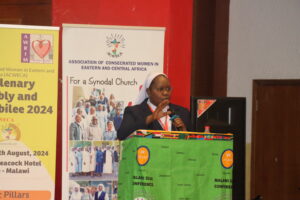ZAMBIA: Catholic Church Explores Self-Sustainability for the Seminaries

 |
| Rt. Rev. Benjamin Phiri, Auxiliary Bishop of Chipata |
The Catholic
Church in Zambia is exploring ideas on projects that would ensure
self-sustainability for the Conference seminaries, says Rt. Rev. Benjamin
Phiri, Bishop Chairman of Priestly Formations in Seminaries for the Zambia
Episcopal Conference (ZEC).
Church in Zambia is exploring ideas on projects that would ensure
self-sustainability for the Conference seminaries, says Rt. Rev. Benjamin
Phiri, Bishop Chairman of Priestly Formations in Seminaries for the Zambia
Episcopal Conference (ZEC).
Speaking to AMECEA Online News in Nairobi where he
had attended an inaugural meeting for the AMECEA Commission for Priestly
Formation in Seminaries, Bishop Phiri, who is the Auxiliary for Chipata Diocese,
said that Zambia has a lot of vocation but the main problem the Bishops are
facing is the sustainability for the seminaries. Since the economy of the
country is not very strong, this translates to the management of Church institutions
as well.
had attended an inaugural meeting for the AMECEA Commission for Priestly
Formation in Seminaries, Bishop Phiri, who is the Auxiliary for Chipata Diocese,
said that Zambia has a lot of vocation but the main problem the Bishops are
facing is the sustainability for the seminaries. Since the economy of the
country is not very strong, this translates to the management of Church institutions
as well.
“We have
been emphasizing a lot about self-sustainability as is the normal saying in the
AMECEA Region to build the Church that is self-sustaining, self-ministering and
self-governing, we are going towards that direction,” he said.
been emphasizing a lot about self-sustainability as is the normal saying in the
AMECEA Region to build the Church that is self-sustaining, self-ministering and
self-governing, we are going towards that direction,” he said.
According to
Bishop Phiri, ZEC has a common process of formation for diocesan priests, run
in three phases; Spirituality Formation at Emmaus Spirituality Centre in Lusaka,
Philosophy at St. Augustine Seminary in Kabwe and Theology at St. Dominic’s
Major Seminary in Lusaka.
Bishop Phiri, ZEC has a common process of formation for diocesan priests, run
in three phases; Spirituality Formation at Emmaus Spirituality Centre in Lusaka,
Philosophy at St. Augustine Seminary in Kabwe and Theology at St. Dominic’s
Major Seminary in Lusaka.
“Currently
the Conference is pursuing ways of making the seminaries self-sustainable. St.
Augustine Philosophical Center is already doing quite well because it is
sitting in a piece of land where they are already practicing mixed farming;
cultivate and keep poultry and cattle,” the Bishop said. While St. Dominic
Major Seminary is right in the city of Lusaka and doesn’t have much space to do
projects as they would want for them for self-sustainability.
the Conference is pursuing ways of making the seminaries self-sustainable. St.
Augustine Philosophical Center is already doing quite well because it is
sitting in a piece of land where they are already practicing mixed farming;
cultivate and keep poultry and cattle,” the Bishop said. While St. Dominic
Major Seminary is right in the city of Lusaka and doesn’t have much space to do
projects as they would want for them for self-sustainability.
“What we are
now thinking as a Conference is to come up with a project which is going to
help us sustain the three seminaries. The project can be situated anywhere in
the country. However, we have not yet come to the details of what project can
be really sustainable in that sense,” he explained.
now thinking as a Conference is to come up with a project which is going to
help us sustain the three seminaries. The project can be situated anywhere in
the country. However, we have not yet come to the details of what project can
be really sustainable in that sense,” he explained.
The Bishops
observed that according to their evaluation of the situation, agriculture is
good but it is a very risky kind of investment because it depends on so many
other factors such as availability of rains. “If one has funds then the best
investment is to invest in real estate such as houses and rent them out in the
city. With this you are assured of something coming in. So we are still
exploring possibilities at national level,” he said. However, he did not show any
commitment as to what type of project the Conference intends to settle for.
observed that according to their evaluation of the situation, agriculture is
good but it is a very risky kind of investment because it depends on so many
other factors such as availability of rains. “If one has funds then the best
investment is to invest in real estate such as houses and rent them out in the
city. With this you are assured of something coming in. So we are still
exploring possibilities at national level,” he said. However, he did not show any
commitment as to what type of project the Conference intends to settle for.
He said that
self-sustainability is slowly becoming a reality in some dioceses where
Christians have accepted the fact that the Church belongs to them and they have
to run it by themselves. “For instance, each Parish in Chipata is able to feed
its own priests, take care of their transport expenses and administration bills.
We are encouraging more and more that the Parishes raise money to even buy cars
for their own priests,” he said.
self-sustainability is slowly becoming a reality in some dioceses where
Christians have accepted the fact that the Church belongs to them and they have
to run it by themselves. “For instance, each Parish in Chipata is able to feed
its own priests, take care of their transport expenses and administration bills.
We are encouraging more and more that the Parishes raise money to even buy cars
for their own priests,” he said.
Chipata, the
Bishop explained, is a rural Diocese where the main economic activity is
agriculture. “Parishes usually hold a yearly thanks-giving ceremony where
people do not bring money but farm produce. These are then sold to generate income
that helps to sustain the running and administration of Parishes throughout the
year.”
Bishop explained, is a rural Diocese where the main economic activity is
agriculture. “Parishes usually hold a yearly thanks-giving ceremony where
people do not bring money but farm produce. These are then sold to generate income
that helps to sustain the running and administration of Parishes throughout the
year.”
By Pamela Adinda, AMECEA Online News


